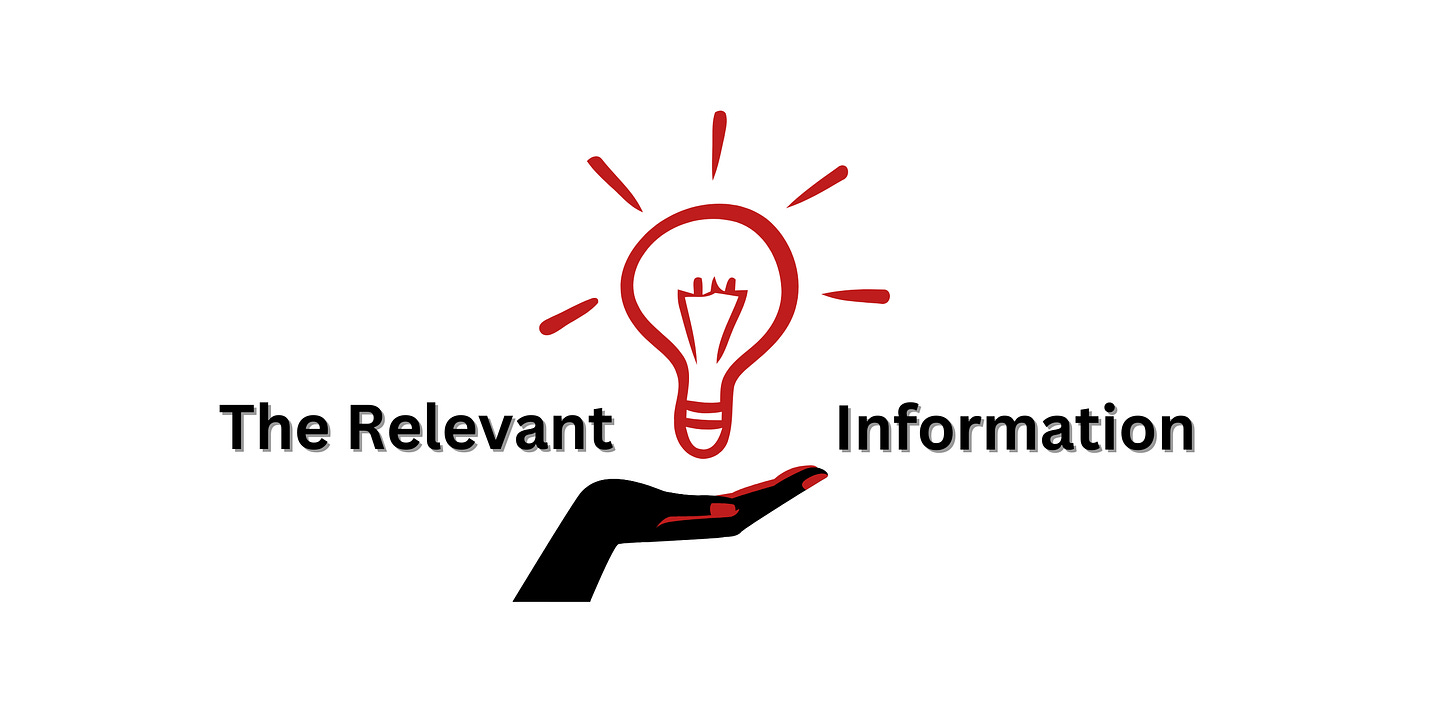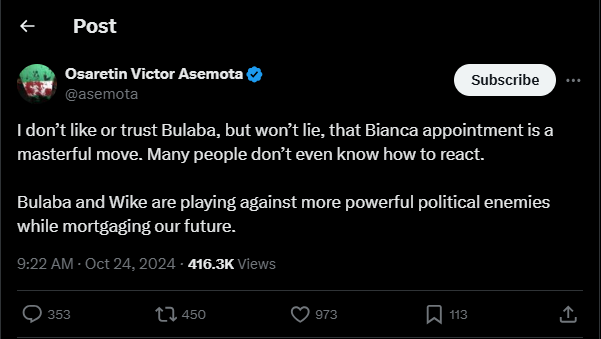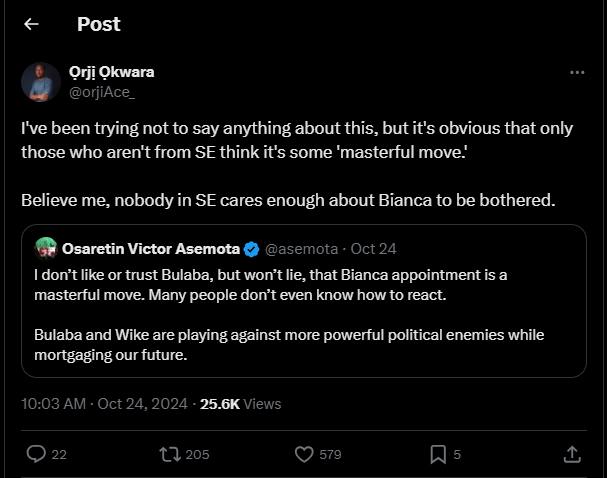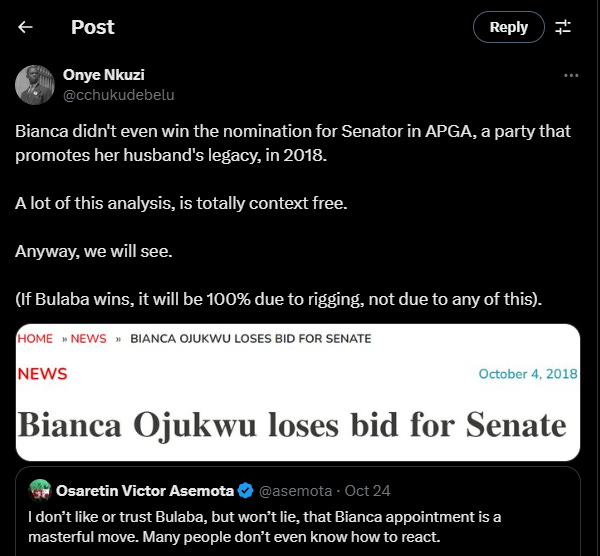The Relevant Information
Edition No #1 of The Relevant Information
Ministerial Appointments and 2027 Planning
On this first edition of The Relevant Information Newsletter
Welcome (and I Hope You Stick Around)
Tinubu’s Bianca Ojukwu Manoeuvre
Welcome (And I Hope You Stick Around)
So I finally did it, I started a personal newsletter to share my thoughts and analyses on things happening in Nigeria, after years of being advised to do so, while politely demurring.
I have always looked at writing/public commentary from the prism of the Arab proverb that sort of says that “to write is to open up your brain and the level of your knowledge to inspection by your readers”, and in doing so I felt - and I still feel - that my brain or my knowledge is not worthy of being inspected by an audience of well informed, professional, and much more experienced people, in the topics that I opine on.
I really do not think I know and understand enough to justify me talking about things in public. Especially as there are more qualified people to opine.
So why did I finally do it?
The world as we knew it over the decades that I have been alive, is changing, and our hopelessly clueless ruling elite in Nigeria, seem to be oblivious to these changes, and are conducting themselves like it is still business as usual.
The collapse of oil prices in 2015-2017, shutting down our ability to finance their rapaciousness, did not clue them in. COVID and the social upheaval that followed when enlightened young people, tired of the bleakness of the boots of the Police, rose up and took to the streets under the banner of #EndSARS, did not succeed in clueing them up.
The rise of US-China rivalry, the Russo-Ukrainian War, a literal Israeli genocide against the Palestinian people, bankrolled and supported by the US/UK/EU and their allies in a cynical bid to settle the Middle East question to their advantage before the next World War; also seems to have failed to wisen up our ruling elite so far.
At the same time as the world is changing, we are dealing with a very uncertain and unstable situation back home in Nigeria, that seems to defy any useful prediction models. The reality is, Nigeria is gradually collapsing in on itself, and we the Nigerian people are individually and collectively being brought to our knees.
The thing with reality is it doesn’t matter what your political or religious beliefs are, it is still going to serve you exactly what you get. So although some people who are members of the ruling APC might be inclined to call me a wailing wailer, reality is, what reality is.
And our reality is that whatever the National Bureau of Statistics or the Central Bank claims the inflation rate is, folks can feel that the real inflation rate is much higher. Nigerians today are united in lamenting how hunger is ravaging the land, how people’s wealth has been obliterated by government’s economic policies, and how purchasing power no longer exists.
A popular joke I have heard in English, Pijin and Hausa, is that today in Nigeria, if you were to save money in the morning, by evening, it will be the one saving you.
In the security realm - which is where I am much more familiar with professionally - rural Northern Nigeria is convulsing with the pains and turmoil of active security collapse. It is a complete farce to argue that there is a Nigerian State and a government in the countryside of the Northern region.
And this is not to shit on the many soldiers, NSDC corpsmen, airmen, SSS operatives and Policemen, who are everyday doing the best that they can, within the limits they are facing.
However anyone who trades, travels, operates or frequently engages with the countryside across all three regions in Northern Nigeria, knows that it is the Wild West out there. Infested with armed groups who are terrorising people. Lawless. Brutal.
Day after day I come across people saying that they don’t understand what is happening in this country, and where we are heading. It doesn’t help that our ruling elite are continually trying to assure us that our eyes are not seeing what our eyes can clearly see.
So, to help folks make sense of what is happening in Nigeria’s politics, national security, global events as they affect us, and just national affairs generally, I decided to follow the constant advice I have been getting, and start The Relevant Information.
This is going to be my personal newsletter - hosted on Substack - where I intend to opine, comment, and provide analysis on these topics in two FREE newsletters weekly - Mondays and Fridays.
I will also drop an embedded newsletter , The Relevant Reads, on Wednesdays (don’t worry it’s also free and you are automatically subscribed), where I will share and talk about articles, reports, analyses from other places that I am reading that week. And there may be a free weekly pod, The Relevant Information Podcast, if I can figure out the modalities of producing it (my voice, hired readers or AI reading?).
If you love my content enough to want to support my work, I may turn on paid subscriptions at some point down the line, so watch out for that.
BUT don’t sweat it at all.
Paid subscriptions/pledges if they do get turned on for content, WILL ONLY BE FOR A SEPARATE paid embedded newsletter, not The Relevant Information Newsletter, not The Relevant Reads and definitely not The Relevant Information Podcast.
So for those of you who like the content but not enough to fork out cash for it, or perhaps you are also Nigerian and have on a very tight financial belt, you have nothing to worry about.
Finally, welcome and I really really hope you stick around. You can also support by sharing this post to your friends, liking our Facebook Page
And now, back to regularly scheduled programming.
.
Tinubu’s Bianca Ojukwu Manoeuvre
On Wednesday October 23, 2024, President Bola Ahmed Tinubu reshuffled his cabinet, firing some ministers, and nominating new ones, subject to confirmation by the Senate.
Amongst the new nominees was the widow of late Biafran seccessionist leader Chukwuemeka Odumegwu Ojukwu, Bianca Ojukwu, who was named as the new Minister of State for Foreign Affairs.
This development had people on social media, especially on Twitter (I refuse to acknowledge the name X), discussing the possible political reasons behind the President Tinubu’s decision, and as to the impact her appointment would have on his reelction chances in 2027.
One side of the debate loudly proclaimed that by appointing Bianca Ojukwu as a junior minister in his cabinet, the President made a genius move that would gain him broad regional support in the Southeast, because of her status as the Ojukwu’s widow.
Some of the people who think this was a genius political move to shore up the President’s position in the Southeast, have even gone so far as to say that by appointing her to his cabinet, he may even seriously undercut the enormously popular Peter Obi, the candidate of the Labour Party in the last election, whose support base is in that region.
The other side of the debate has largely contended that her appointment is irrelevant, as Igbos (the predominant ethnic group in the Southeast for the non Nigerians reading), are not a people that are swayed by the political preferences of their elite.
Some on this side have even gone so far as to declare Bianca Ojukwu a political nobody, incapable of winning an election even within the Ojukwu clan. Which to be fair, is a harsh but fairly accurate description of her political capital.
From her previous stints as a High Commissioner to Ghana, Ambassador in Spain, and Permanent Representative to the UN World Tourism Organisation she has earned a reputation of competence. But politically she has not demonstrated a record of either mobilising voters, mobilising political elites behind her or even influencing popular thinking.
In 2018, she ran for the ticket of the All Progressives Grand Alliance (APGA) to represent Anambra South Senatorial District, the district her late husband’s hometown, Nnewi, falls under, in the 2019 elections. She never made it past the primaries.
APGA is the party under whose banner her late husband had contested for Nigeria’s presidency severally. In fact, APGA was not just a party Ojukwu ran for office under, APGA was Ojukwu’s party, and at one point was the party that most closely represented the streets of the Southeast.
There’s a good article here that lays out the story of how she not only lost the primaries, but was never even a serious candidate for the ticket, not to talk of the general elections, beyond the hype of having been Ojukwu’s wife.
However what she lacks in terms of the actual power that comes with being a political force, she has somewhat replaced through the prestige, privilege, and access that being the daughter of the late Christian Onoh (former Governor of the old Anambra State), a man of many accomplishments, and the wife of the Chukwuemeka Ojukwu, has given her.
Her sister, Lilian Onoh was an Ambassador to Namibia and Jamaica, while another sister Nuzo Onoh (a celebrated writer) was married to Goeffrey Onyeama, the Minister of Foreign Affairs during the Buhari years- although that marriage allegedly ended acrimoniously.
If Bola Ahmed Tinubu is a consummate political strategist (he is), surrounded by a tight group of skilled political operators (he has such a group), then what would be his motives for appointing a political lightweight to hold the ministerial slot for Anambra State in his cabinet?
The President flanked by some of his closest advisers. Copyright SolaceBase.com
The answer to this question is two-fold. One part goes through his relationship with the current governor of Anambra, Charles Chukwuma Soludo, and the other has to do with the calculations for the 2027 elections.
The current Anambra governor and the incumbent President of Nigeria are known to be real life friends, and while Soludo is not in the APC (he is in APGA), he is in no way, shape or form any sort of opposition to the President. He comes from the same school of economic thought as the President does, and currently supports the administration as an economic adviser.
Like Bianca Ojukwu, Governor Soludo is not the typical Anambra politician, he is every bit an intellectual and elitist, who is not known for being tied to the grassroots.
However unlike Bianca, he had the money, the vault full of favours owed to him, political acumen and enough powerful supporters to ensure he became governor over the machinations of the traditional grassroots politicians in the state. Politically within APGA, where she serves as a member of the party’s Board of Trustees, Bianca Ojukwu has been noted as a firm supporter of Governor Soludo, for years prior to his becoming governor.
Soludo’s personal relationship with the President, played a role in Bianca Ojukwu’s cabinet nomination, but it was not the only factor.
Charles Chukwuma Soludo and President Bola Ahmed Tinubu. Copyright The Guardian Nigeria
The most important factor for why she was nominated is the 2027 elections, and it has nothing to do with the votes she can muster or the political heavyweights she could potentially mobilise. Rather, it has everything to do with her prominence. And elite status.
To understand this, one has to realistically study how the 2023 Presidential Election was decided. While it is popular on Twitter for activists and young people to say the President didn’t win the election legally, this flies in the face of reality. The reality is he won the election both through the frontdoor and also the backdoor, and not necessarily through the blatant rigging of the polls that supporters of Labour Party’s Peter Obi would like to believe he did.
If we are talking reality, in short form elections in Nigeria are won through the frontdoor - I.e gathering required threshold numbers, winning prescribed constitutional geographical percentages, ensuring your paperwork is in order - and also through the backdoor. The backdoor is where voter bribery, voter intimidation, ballot stuffing (in the old days), lawfare to overwhelm the competition pre-election, and judicial manipulation post election, all come into play.
Of the four main candidates in the 2023 election, only one (the current president) had a solid numbers mobilisation game in four of the six geopolitical zones of the country. The Atiku campaign lost the numbers game in the Southeast and South South , through its own unforced errors, when Peter Obi defected to the Labour Party unannounced with his base, and Nyesom Wike was snubbed for the Vice Presidential ticket in favour of Ifeanyi Okowa.
The Obi campaign simply couldn’t get the numbers it needed in Northern Nigeria, and Kwankwaso was too financially under-resourced to mobilise voters outside Kano State.
The Tinubu campaign on the other hand barely managed to scale through via the frontdoor. in the three Northern zones and the Southwest, placed where political leaders control or strongly influence large voting blocs.Its scaling through in those regions was ultimately possible because of the political and economic alliances it made, however its core weakness lay in the Southeast and South South.
In the Southeast and South South, political blocs with grassroots and street power barely exist, and if the people dislike you (as they largely do the APC coupled with a very unpopular candidate nationally), your entire hope lies on winning through the backdoor.
But in order for the victory gotten via the backdoor to survive post election scrutiny, you need to be able to imbue it with legitimacy. To do so, you require legitimate institutions, credible figures e.t.c to either rally around it, or be entirely silent.
And since what was required was 25% of votes cast in the Southeast and South South, this was a very easy sleight of hand to be pulled, minus the 'extraness' a certain governor did in delivering his South South state.
In the case of 2023, legitimate institutions pulled the strings that produced the numbers, and credible elite figures came out in support of the current President. This ensured that while accounts of Obidients on Twitter were railing that their candidate had been rigged out in his core base region, they could easily be dismissed by the various organisations (media, international observers, diplomatic missions etc) that bestow Third World elections with credibility and political legitimacy.
In 2024, the current administration has presided over the most dramatic economic decline witnessed by the young people, who make up the majority of voters. It is easily the most unpopular administration since the 1999, in fact dislike of it is one thing this otherwise fragmented country, unites on. But like every group of people who come into power, this government intends to retain the Presidency in 2027.
For the Northern regions and the Southwest, perhaps there’s a strategy to reach deals with regional and local elites, and spend massive amounts of money to ensure that they manage to scale through in those areas.
For the South South and Southeast, they solely need to clear the prescribed constitutional bare minimum through any means necessary, and have it legitimised by local elites who can be used to discredit platformless youths dissatisfied with the results.
While Bianca Ojukwu may not be as politically relevant as some people think is necessary to win the Southeast, she carries a credible enough name and possesses the elite credentials to lend the needed credibility and legitimacy to claims of support that justifies the ticket getting that constitutional bare minimum, in a region that hates the candidate.
And lest we reduce the entire game to her and her appointment, remember, she is just one person, one appointee.
All is after all fair in love, war and Nigerian politics.








